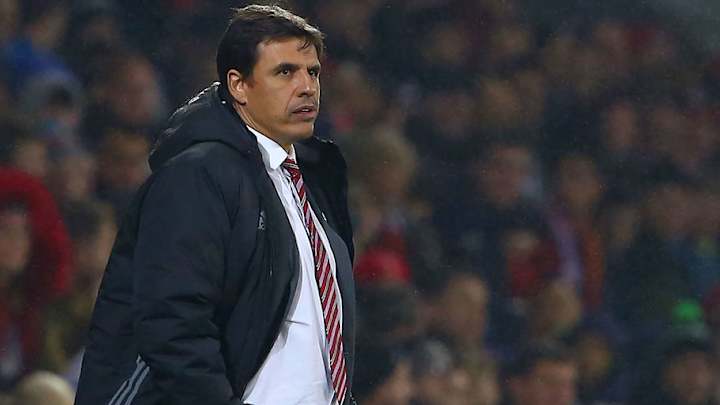Why Chris Coleman Is Now In No Lose Situation With Sunderland After Accepting the Reins

24 hours removed from yet another catalogue of individual errors at the Stadium of Light, forcing Sunderland to settle for an unhelpful point against a truly lacklustre Millwall, the Black Cats finally revealed one of the worst kept secrets in football by appointing new manager Chris Coleman.
The former Wales international boss arrives in the north east with his family, the first to do so since Steve Bruce, off the back of what was an overall disappointing World Cup qualification campaign.
When we look back on Chris Coleman's reign, some may see a cautious manager, most will see a manager who inspired a squad of very mixed abilities to reach previously-unimagined heights, but above all, he always conducted himself with class and dignity. That counts for a lot.
— Simon Price﮷ (@simon_price01) November 17, 2017
A 57th minute Irish sucker punch from James McClean on October 9 drew a close to the Dragons' chances of reaching the finals in Russia next summer, a harsh reality for the 47-year-old and his side, who had enjoyed unrivalled success less than 18 months previously in France.
Coleman's future from that point remained in doubt, with demands of salary, permanent assurances for his backroom staff and facility improvements all standing between the proud Welshman and the ink of his signature staining a new contract.
However, despite speculation he watched on again as his side surrendered a last minute lead to 49th ranked in the world Panama, a sour moment that would turn out to be his last in the dugout of his home nation.
🏴 Farewell, Chris Coleman.
— BBC Sport Wales (@BBCSportWales) November 18, 2017
👏 You did Wales proud!
❤ "Don't be afraid to have dreams" pic.twitter.com/EzjhDTdWpR
Four days later it was announced the Swansea-born orchestrator would be stepping down after six long and mainly successful years, a position he initially took up in the hardest of circumstances after the death of Gary Speed.
Coleman was set for club management once again, and he was to do so with Championship basement side Sunderland.
WE DID IT!
— A LOVE SUPREME (@ALS_Fanzine) November 18, 2017
Sunderland now hold the record for longest winless run at home in English football.#DareToDream
Much was made of the decision to leave an organisation that had flourished under his watch, one in which he could do no wrong nor have his legendary status doubted. An outfit that he had developed into tournament semi-finalists, and one packed with both stars of today and of the future. There was but one simple question.
"Why?"
If the once man of Fulham, Real Sociedad, Coventry City and AEL's press conference is to be believed, it is the challenge of a 'big club'.
Great piece of business by Sunderland. What a coup. Delighted for Chris Coleman as well. The Black Cats are a proper club. The comeback starts now.....
— Richard Keys (@richardajkeys) November 18, 2017
However, a large portion of the reasoning behind the switch surely has to be that Coleman now finds himself in a position where he simply cannot fail, and he knows it.
In over less than 18 months Sunderland have become a dwarf of their former selves. A basket case enveloped within layers of apathy, haplessness and self-doubt. An institutional failure of insurmountable levels.
Or so we are led to believe.
Discussing his #whufc job, David Moyes blunt about Sunderland failure. 'I made a poor choice in the club I chose. I didn’t do enough due diligence.'
— Ian Herbert (@ianherbs) November 8, 2017
David Moyes insisted he had not completed his due diligence on the Black Cats before taking control of a side who had lost once in six months, an outfit boasting one of the most reliable goalscorers the Premier League has ever seen and, of course, before spending nearly £40m, despite owner Ellis Short's lack of financial backing.
But before the Scot a different breed of character, not witnessed on Wearside since, was instated. Sam Allardyce will now forevermore have his seat on the top table of Black Cats history. A man who defied the odds to rescue a club on its knees and utilise its ninth and final life to its fullest.
The two ends of the spectrum could not be further apart, and Coleman knows his future is destined for one of them.
Chris Coleman unveiled as new Sunderland manager alongside chief executive Martin Bain pic.twitter.com/NXFz0seNn0
— Craig Hope (@CraigHope_DM) November 20, 2017
Whether the Welshman receives legendary status by systematically, brick by brick, rebuilding the fallen Premier League mainstay through the determination, will and associated luck that guided his Wales side into a land of undreamed success on French soil.
Or he, like Moyes, cowardly dissects any last remaining spirit and hope from the almost bare Stadium of Light, and disrespectfully wipes his feet on the passion, soul and very being of the long-standing, traditional club as he walks out of the door unscathed.
Either way, he cannot lose, as with the latter, the 'poisoned chalice', 'rotten core' and 'insurmountable expectations' of Sunderland have simply claimed another victim. Or alternatively, he scales the hypothetical ladder of heroism that much higher, as with Allardyce.
In essence, that is why Mr Coleman's job title now states: 'Manager of Sunderland Association Football Club'.
